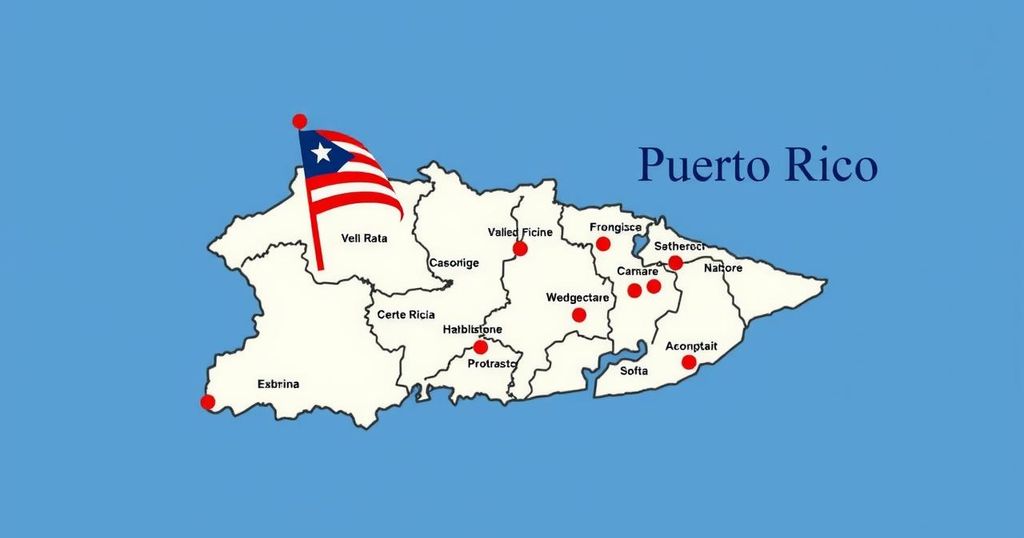Historic Election on the Horizon: Third-Party Candidate Challenges Established Dominance in Puerto Rico

Puerto Rico is set to hold historic elections on November 5, 2024, as third-party candidate Juan Dalmau poses a significant challenge to established political parties, reflecting a growing desire for change amidst voter frustration with corruption and mismanagement. Polls indicate a close race between Dalmau and Jenniffer González of the New Progressive Party. While traditional party dominance wanes, young voters may drive a new wave of participation in this election, further complicated by a nonbinding referendum on Puerto Rico’s political status.
As Puerto Rico approaches its Election Day on November 5, 2024, the political landscape is poised for significant change. For the first time, a third-party candidate, Juan Dalmau of the Puerto Rico Independence Party and the Citizen Victory Movement, is gaining substantial traction in the gubernatorial race, positioning himself as a formidable challenger to the establishment candidates. Recent polling data suggests that Dalmau is closely contesting with Jenniffer González, the candidate from the New Progressive Party, with 29% and 31% support respectively. This shift reflects a growing discontent among the electorate, who are increasingly frustrated with ongoing issues such as corruption, power outages, and mismanagement of funds. Political analysts note that this election may represent a historical turning point in Puerto Rican politics, galvanizing a younger demographic motivated to instigate change. The traditional dominance of the New Progressive Party and the Popular Democratic Party has been challenged, especially in the wake of fiscal crises and the oversight of Puerto Rico’s financial affairs by a U.S. federal control board. This backdrop of economic hardship since the island’s bankruptcy filing in 2017 has fostered a climate ripe for new candidacies. Despite the momentum of third-party candidates, concerns regarding voter apathy persist, as evidenced by declining voter turnout in recent elections. Nevertheless, recent engagements, including increased voter registrations leading up to the elections, indicate potential shifts in participation demographics, particularly among younger voters, who favor Dalmau. Furthermore, the political discourse has been enlivened by cultural figures such as reggaetón artist Bad Bunny, who has openly criticized Puerto Rico’s established parties through billboard campaigns, thus amplifying the voices of the disenchanted electorate. This election also sees the return of a nonbinding referendum regarding Puerto Rico’s political status, which will further shape the political narrative moving forward. The outcome of these elections could signal a pivotal moment in Puerto Rico’s governance and its long-standing issues with status and representation.
Puerto Rico has historically struggled with governance, largely influenced by its political status and economic challenges. Following a severe recession and the aftermath of Hurricane Maria, the local government’s inability to manage public resources has led to a significant public outcry. By 2016, congressional intervention established a federal oversight board due to a burgeoning public debt crisis exceeding $70 billion, complicating the local political landscape markedly. The political scene has been dominated by two main parties—the New Progressive Party, advocating for statehood, and the Popular Democratic Party, supporting the current commonwealth status. However, growing discontent among voters over systemic corruption and inadequate governmental response to crises has paved the way for emerging third-party candidates, establishing them as serious competitors in the upcoming elections.
In summary, as Puerto Rico approaches Election Day, the political climate reflects both a culmination of past grievances with governance and a hopeful awakening among the electorate. The emergence of third-party candidates like Juan Dalmau signifies a potential shift away from traditional party dominance, as voters demand accountability and substantive change. The results of the upcoming elections may not only govern Puerto Rico for the next term but also shape the trajectory of its political identity and future negotiations regarding its status with the United States.
Original Source: apnews.com







